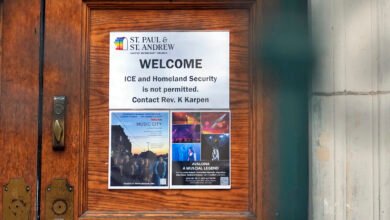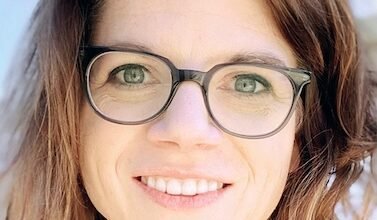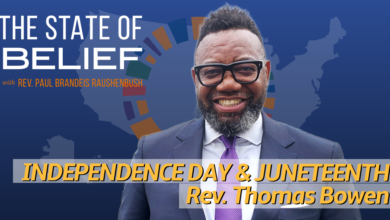Don’t let the war tear apart the tapestry of faith that makes America strong

(RNS) — In one weekend this month, hundreds of synagogues and Jewish communal organizations were targeted by bomb threats, causing evacuations and concern for the safety of thousands of Jewish Americans. These attempts to terrorize American Jews add to the exponential rise of antisemitism and anti-Jewish violence that seemed unimaginable a decade ago and add to the fear and existential threat felt by my Jewish friends, colleagues and family members.
Jews, unfortunately, are not alone. Threats and violence have also been aimed at Muslims, whose communities have experienced a horrific spike in hate crimes, some of which led to injury and, most poignantly, the death of a young boy. Mosques are on high alert and Muslims I know have shared the pain of feeling targeted and isolated. They fear for their safety and future.
In addition to daily antisemitism and Islamophobia, both of these communities are shouldering the heavy burden of a war in the Middle East. That war has come with a degree of loss unknown to today’s Israelis and Palestinians, losses that are deeply felt among their connections in communities here in the United States.
I recently spoke with Imam Abdullah Antepli, a leader who has worked for peace between Jews and Muslims for decades. Three of his former students, Jewish Israelis, were killed by Hamas on Oct. 7; five days later he lost five Muslim colleagues in Gaza. We at Interfaith Alliance, the organization I lead, have heard from members of our affiliate network about the pain they are carrying, including a rabbi who is caring for her congregation while also grieving a loved one killed in the Oct. 7 attack.
Those of us who work to bring understanding among people of diverse faith traditions, no matter our own faith, are horrified too to see the religious tapestry that makes up American democracy begin to fray and tear apart. Having worked for interfaith cooperation for almost three decades, I have never experienced a more challenging and heartbreaking time.
Yet inaction and retreat are not the answer. I have never been more convinced that we can, and we must, continue to be in relationship with one another. We can feel passionately that our own views on the crisis are just, even as we acknowledge that others may have very different views. We must acknowledge the pain people are feeling on all sides and acknowledge the humanity of people we disagree with.
We must not succumb to the temptation to dismiss the “other” — mustn’t “harden our hearts,” as the Jewish scholar Jay Michaelson, quoting the Bible’s Book of Hebrews, said on the Interfaith Alliance podcast in October. Our disagreements cannot and must not stop us from working together to counteract the rising hate targeting the Muslim and Jewish communities.
I am inspired by the people from a wide range of traditions who have come together, seeking understanding and pledging one another support. Recently, Interfaith Alliance members attended the national launch of a multifaith commitment to fight anti-Muslim and anti-Jewish bigotry led by the Shoulder to Shoulder Campaign, a group founded to push back against Islamophobia in America. Imam Talib Shareef, Rabbi Rick Jacobs and the Rev. Teresa Hord Owens, led by the executive director of Shoulder to Shoulder, Nina Fernando, showed us the importance of showing up for one another.
These leaders also recognized that, while the Israel-Hamas war had contributed to the hate Jews and Muslims were experiencing, Islamophobia and antisemitism were at their highest level in decades before the war — in large part due to the rise in Christian nationalism that is plaguing our country and that will take all of us to defeat.
This is not the time to retreat into ourselves. We need each other. We must get back to the basics of dialogue and relationship. To spark this movement, Interfaith Alliance recently produced an Interfaith Community Pledge, in which we commit to the belief that the forces that unite us are greater than those that divide us; that we will create space for the needs of impacted communities; that we reject hate in all forms; and that we remain committed to dialogue and the endurance of our interfaith partnerships. I encourage you to join us.
In this holy season in my own Christian tradition, my fervent prayer is for peace in the Middle East and an end to the killing. My prayer is equally for peace in our communities in the United States, so we might come together to work for the end of antisemitism and Islamophobia and for the freedom, rights and dignity of each person, and continue the work of achieving our democracy.
May we have the strength and the courage to extend a hand even in this most shadowed time and walk together in hope into a better future.
(The Rev. Paul Brandeis Raushenbush is a Baptist minister and president and CEO of Interfaith Alliance. The views expressed in this commentary do not necessarily reflect those of Religion News Service.)
Source link





